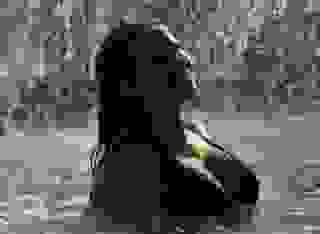- Novels and Novellas
- Wolf Creek Ch. 21
Note: You can change font size, font face, and turn on dark mode by clicking the "A" icon tab in the Story Info Box.
You can temporarily switch back to a Classic Literotica® experience during our ongoing public Beta testing. Please consider leaving feedback on issues you experience or suggest improvements.
Click hereThe atmosphere in the Manchester Walker mansion was so cold and austere—and judgmental—that Ada could feel herself drying up and withering away from the inside. But this is exactly what she wanted; if she had known how to enter a convent, she would have done so. She wanted this cancer of sensuality inside her to be lanced and to flow away.
The Walker sisters were more than willing to oblige her. That sat stonily, day after day, in their drafty drawing room overlooking the sluggish Merrimack River and stared judgment and admonishment at their offending sister-in-law. They didn't condemn Ada for her sensuality—they would have fainted away and died on the spot if they had any notion of that whatsoever. They blamed Ada for their brother's idiotic journey to that heathen land of half-naked little brown people in Malaya, half way around the world. And they did so regardless of the knowledge that Ada hadn't even married Stanfield until after he had accepted the posting to Kuala Lumpur. But above all, they blamed Ada for Stanfield's death. He had left with her and she had returned alone. There was no saving her from this offense.
They sat there through 1945 and 1946 and 1947, politely pouring Ada tea while willing her to wither before them with their cold stares. And wither Ada might have done if it had not been for her art. After she had grown so tired she could hardly breathe from her grief over the deaths of so many who meant so much to her and of her guilt at having mistaken Jess Wolf for his father and her husband, Frank, when she was in a pill-induced haze in addition to so many other actions and thoughts she regretted, Ada slowly turned to what gave her the most solace and release—her art.
As always, Ada's painting clearly reflected her mood of that period. And the Manchester period of her painting could only be described as the period of the dead. She painted dead things, and the winter months were her most active. She painted leafless trees against the frozen Merrimack. She painted a fallen bird or doe against the snow-covered forest floor. She painted a broken window in a barren, unused room and the bouquet of flowers in from the sterile dining room the week after it had been cleared and dumped in a pot by the mud room door for composting. She painted the barren pile of the Walker mansion she now called home. And, above all, she painted the Walker sisters at tea, already dead but just not knowing they were.
The Walker sisters didn't approve of her painting, of course. They didn't approve of any commercial work, and what Ada painted she was able to quickly sell through her Chicago agents, which meant the Walker sisters could not, no matter how much they tried, make Ada dependent on them. Although Ada was now painting dead things, her talent and the strength of her art didn't fail her; the paintings were still magnificent and, if anything, more moving to the beholder than anything she had painted before.
No, Ada was in no way financially dependent on anyone else during this segment of her life. For some reason her paintings, any painting by her, were in great demand. There was a rumor that some rich collector was searching them out and buying them up. The probable truth to this was evident when Hugh, back at the ranch now after successfully surviving his Navy stint in the now-ended Second World War, had called her in one of their rare telephone exchanges, saying that someone who knew the Malaya collection of her paintings was at the ranch wanted to buy them all and all of the paintings that were the original artwork in the lodge when they first opened up the dude ranch. Ada had said to go ahead and sell them. She hardly could have them here in New Hampshire. The Walker sisters would be scandalized.
When Hugh had first returned to Colorado from the war, Ada had contemplated traveling back to Wolf Creek valley, if only for a visit. But in their first telephone conversation, Ada had learned that J. Harvey Kincaid had also resumed his quarterly trips to the ranch and his hunting trips with Hugh up to the Hahn's Peak timberline. That had put an end to any desire on Ada's part to be at the ranch or to be in her son's presence for any length of time. She could hear the strain in his voice from across the country. She didn't know how she could relate to Hugh knowing what she did about those hunting trips.
Ada did, however receive periodic photographs of the family, showing Beth as sunny as ever and Ada's grandson, John, now a preteen and showing promise of being a handsome heartbreaker. A true Raven. Surprisingly enough, most of what Ada heard about her family and life at the Wolf Creek Ranch came by way of Missouri. Aunt Martha, as resilient and tough as always, had returned to a retirement home in Slater, Missouri, but she kept in constant contact with the Ravens in Colorado and her own niece, Ada, in New Hampshire—ever the interested go-between, always looking out for Ada well-being.
Aunt Martha was also as prescient and patient—and as interfering—as ever. She watched her niece from afar and, by the spring of 1949, she knew it was time, that Ada was ready. One beautiful morning—even in New Hampshire, barely awakening from its winter—a visitor for Ada appeared on the marble front steps of the Walker manse. A twittering and scandalized Walker sister ushered him into the drawing room, and the sisters, not wanting to be any part of whatever terrible thing was about to transpire in their well-ordered, withdrew immediate to leave Ada to manage this intrusion on her own.
"William!" Ada exclaimed in both surprise and pleasure. William Hagen had appeared once more, as he was prone to do at Ada's major junctures in life.
"I need your help, Ada. I need you to come back to Denver. Can you possibly tear yourself away from here and come help me?"
"Tear myself away?" Ada was almost choked by the laughter that threatened to bubble up from her throat. "How could I possibly help you?"
"Just as you have before," William answered. He had taken one of her hands in his, and Ada felt her fingers warming for the first time in four long, cold years. William's timing could not have been better, as Aunt Martha well divined. Ada had grown weary of blaming herself for her desires to live life to the fullest and to take the grief with the joy, the mistakes with the triumphs. The Walker sisters were both withered and withering and hadn't change a zot in the whole time Ada had been here. She was dying to revolt.
"My company has been building a new art museum out near Lakeside next to that golf course at Lake Berkeley. I need someone to do the interiors. I need you. Will you come back with me?"
The Walker sister's jaws dropped and stayed locked in that position at how fast Ada was able to prepare to leave for Colorado with William Hagen. And it was with great politeness, restrained civility, and absolutely no regrets from any quarter that Ada and the sisters saw the last of each other the following morning.
William Hagen hadn't exactly lied when he said he needed Ada to do the interiors of the new art museum in Denver, but he'd certainly played loose with his wording. When they arrived at the nearly finished building the day after their train had pulled into the Denver station, Ada found that the interiors had already been "done" and by her. The collector who had been buying up Ada's paintings was William Hagen, and the museum was the Ada Raven Museum of Art.
Ada walked through the tastefully understated and well-lit exhibit rooms with her mouth hanging open and her eyes overflowing with tears as, from one room to the next, she moved through her early Colorado mountain valley period to her East Coast period to her three Malaya periods and, at last, to her bleaker Merrimack River period. Beyond this room, however, was another, one that was essentially a wide corridor around a sunny atrium. They stopped in the doorway when they reached this point.
"These paintings in the New Hampshire room are magnificent, of course," William said. "But I hope there will be another, more uplifting, period now that you've returned to Colorado. One that we can celebrate in this hall someday."
"There will be, depending on you, Bill," Ada said, turning her tear stained and sparkling eyed face to his.
"Depending on me?" William asked.
"Yes. Will you marry me, Bill?" Ada asked.
Hagen was overwhelmed that she had asked that from out of the blue. He had pursued her for forty years—and it had taken him nearly that long to work up the courage to ask her to marry him. And she had refused. She had said there was someone else.
"I don't understand. You said there was someone . . ."
"There have many, many someones, Bill. I can't and won't lie to you about that. But they have come and gone. And even while they were coming and going, there was always you. You were always there, and I was just too blind to see it. Well, a handful of years in the deep freeze that is my sister-in-law's environment was enough for me to see more clearly. I have no idea how you put together all of these paintings or how you found me in Manchester or how you came to me just when I needed you again—and this time with my eyes open. But I want you now. I completely understand if you don't want me anymore. And if you don't, I will live with that. But, yes, I'm asking you to marry me . . . if you will."
This wasn't a spur-of-the-moment whim on Ada's part, one set off by the overwhelming surprise of seeing that William Hagen was paying her the homage of opening a museum dedicated solely to her art. She had known as soon as he entered that drawing room in Manchester that she wanted him if he'd had her. And she was resolved not to care if sex was not to be part of the picture. She was nearly sixty-five now. She could live without sex now. Lord knows she'd lived without in her sister-in-laws' house for several years. She'd be content with just the companionship now.
But the surprise was on her. They celebrated their engagement that evening at the dining room of the Brown Palace Hotel and then, to Ada's surprise and delight, a little later in an upstairs suite at the Brown Palace, where William Hagen showed her, in his slow and steady, but sensuous and completely fulfilling way that, although he'd waited on her patiently these last several decades, he hadn't waited for her to the point of celibacy. He took her expertly and gave her complete satisfaction in several hours of rising and falling and inning and outing and quiet moans and orgasmic spasms that left her in no doubt that he still wanted her and had every ability to enjoy what he wanted.
For nostalgia sake, Ada Albin Raven Walker married William Hagen in the quiet glen halfway between his saw mill and her Brook House by the upper branch of Wolf Creek on a sunny morning in June of 1949. Ada was just shy of sixty-five years of age. Hugh's family; Ada's other son, Dan; and her stepson, Jess Wolf, were all on hand to celebrate the occasion with her. There was no tension or guilt between Ada and Jess. They had long ago come to terms with the unfortunate mistake they had made, realizing that he had taken her letters to him to mean something more than she had meant when she wrote them and that their short sexual interlude had been instigated completely by her when she was in a drug-induced fantasy world and had mistaken him for his father. Several of the celebrity guests from the ranch were also there, including J. Harvey Kincaid, who stood by, making small talk with the other ranch guests that had them tittering about with laughter and taking the whole event with much amusement. Beth was radiant and young John was a delight, at twelve trying to act like a serious man, but Hugh was tense and nervous throughout the ceremony and the reception at the lodge afterward. Only Aunt Martha was missing, far too old now to make the trip from Missouri. She marked the day with a small glass of sherry at the precise hour vows were being exchanged and a sigh of satisfaction of a job well done.
At one point during the reception, Ada thought Hugh was about to say something to her, but then J. Harvey wafted by and the moment had passed. Ada ached for it all just to come out in the open. Having to work their way out of reality couldn't possibly be worse than what they had now, Ada thought.
Immediately after the wedding reception, Ada and William were off on the road for the long drive through the Rocky Mountains and over Rabbit Ears Pass and down into Denver, where Ada commenced a life that was as different from her cloistered years in exile in New Hampshire as it possibly could be. The Hagens, major art patrons now that they had opened their own museum to the public not to mention all of the other cultural endeavors they supported, became the talk of the town, cultural moguls and benefactors. William's construction company worked on some major public buildings and monuments gratis, and the acclaimed artist, Ada Raven, became not only the hostess of choice in the city but, dredging up her early history in politics, ran for and easily won a seat on the city council.
Although Ada did represent the arts interests on the council well, what she really became famous for was her work for services for the elderly. She was beginning to feel her age now even though she was only partially gray and still was the most beautiful woman in any room she entered. She had been concentrating on both ends of the spectrum in Denver. She did everything she could to enhance the cultural opportunities there, but she didn't neglect seeing the poverty around the center of the city and, especially, the plight of the elderly poor. She became the talk of the nation in 1953 when she rose in the Colorado Senate as a guest speaker and rattled off the essential guts of a detailed plan for a revamped elderly care plan for the state and declared that she, one of the elderly herself, was going to stand at the podium until everyone in the assembly stopped talking about what they could do and started doing something. The Senate roared with laughter at her audacity, not to speak of the seasoned rancher's wife expression that were coming out of an elegantly dressed and coifed culture icon, and they sat down and voted the bill she essentially gave them within weeks rather than their usual pace of years and decades.
Everything was going like the end of a fairytale until . . .
On a winter day in 1956, a weary Ada, today looking every one of her seventy years of age, struggled up the dirt road from Brook House toward Hagen's saw mill, being supported on one side by her husband, a somber William Hagen, and on the other side by Ada's only surviving son, a quietly snuffing Daniel Raven. Ada was carrying a small casket under her arm because Beth Raven couldn't bear to handle it herself. When they reached the glen halfway between Brook House and the mill, Ada stooped next to the partially frozen stream of the upper Wolf Creek and consigned the ashes of her son, Hugh Raven, to the waters of the creek.
Ada and William had been in Chicago that January when a distraught Hugh had shown up at the door of their Denver house. The housekeeper had tried to calm him down and offered to phone Ada so that they could talk even though she wasn't home, but Hugh had just stumbled back into the face of a sudden raging snow storm. Everyone in Colorado knew you didn't try to go west from Denver and up over Rabbit Ears Pass in a heavy snow storm coming from the west. Everyone who had lived in Colorado for any length of time knew that. But that's what Hugh Raven then did. They didn't find him, inside his stalled car, frozen, for another week after that—not until Ada and William had returned to Denver from their consultation with Ada's art agents and not until a frantic Beth had set the state safety patrol into action.
Beth had no idea what had upset Hugh so and why he was searching his mother out. Nothing out of the ordinary had happened that she was aware of. He had gone off to a reunion of his Navy buddies in San Diego in the late fall, but that had been planned well in advance and he always liked going to those reunions. The only unusual thing that happened around then was that their regular guest, J. Harvey Kincaid, had shown up for his quarterly visit at a time other than when he was scheduled to visit. Always before Hugh had been there to take Kincaid on his regular elk hunting trip up on Hahn's Peak. This time, since Hugh hadn't been here, their son, eighteen-year-old John, had taken Kincaid on the hunting outing. Other than that, nothing unusual had been happening at the ranch at all.
When Beth told Ada this, Ada did everything she could to maintain control of herself. But as soon as Beth left her room, Ada broke down in tears and wasn't able to pull herself together for weeks after she and William had returned to Denver.
What she did now—or at least tried to do—was what she should have done years ago and might have done if Hugh had not frozen her out of every attempt to talk to him about his relationship with J. Harvey Kincaid. She tried to reach Kincaid by phone at first, determined to tell him it was time for him to do his hunting elsewhere—and that she would make his life a living hell in public if he didn't back off his obsession for possession of her family. When trying to connect with him by phone didn't work, she found an excuse she could reasonably give to William to visit Chicago, and she went off to bring Kincaid to ground in person. In Chicago, though, she learned that Kincaid was on African safari and couldn't be reached. Ada returned to Denver in defeat and shelved the issue for when she'd heard Kincaid had returned to the States.
Later that spring, Ada decided she wanted to paint another seasons collection of the landscape around Wolf Creek, but she didn't want to stay at the lodge. William provided the solution. He had taken a look at Brook House when they were there for Hugh's funeral, and he wanted to fix it up. In fact, he already had crew up there working on it—putting in electricity, new appliances, a coal stove insert in the central chimney, better insulation, and a telephone. They would return to Brook House for the year. He was very much aware of the toll Hugh's death had taken on Ada. It was like she had aged twenty years over night. Little did he know that Ada had much more than the departed Hugh to think about.
That spring, summer, and fall of 1956, indeed, was the medicine Ada needed. Living there, back in Brook House, and reliving her memories there—even running her hands over the tire inserts in the dining room railing of the Shaffer touring sedan Pete Fair had driven her from Indiana in—were grounding Ada again rather than upsetting her. She had come back to Brook House for release and she was getting this through the environment here, her ability to translate her feelings in her art, and to the calm steady presence of her husband by day and his continued fulfilling lovemaking at night.
By early winter Ada had done so much painting that the house was overflowing and she decided to send the spring, summer, and fall canvasses back to Denver before starting her winter season work. They spent all day packing up paintings in their first-floor bedroom and, as darkness was falling and the truck was leaving for Denver, their bedroom was a packing room nightmare.
They decided to just sleep in the big bedroom upstairs that night and clean up the mess in their own bedroom the next day. The last thing William did before going upstairs to Ada's bed that night was to stoke up the coal in the stove insert in the fireplace. It was going to be a very cold night.
* * *
The next day, Beth couldn't raise Ada on the telephone. She had missed coming up the hill for breakfast at the lodge and had promised that she would be there.








